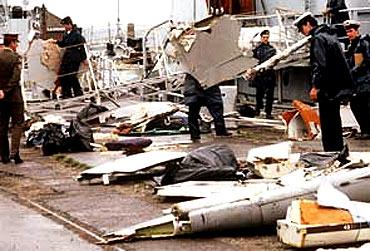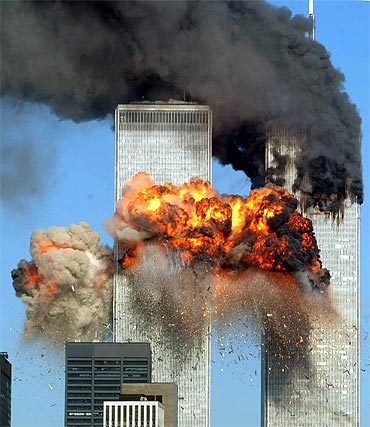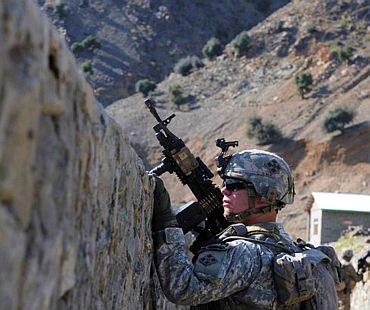 | « Back to article | Print this article |
Lessons from ten years of the global war on terror
Colonel (Dr) Anil Athale (retd) on how the global war on terror has changed the geo-politics of the world and India's role in it.
It is more logical to call it ten years of 'America's war on terror' because the soft state that is India has been suffering from this scourge for much longer period, nearly 30 years. It needs reiteration that till the terror attacks on 9/11, the biggest single terror strike was the blowing up of Air India Boeing 'Kanishka' on June 23, 1985. In that attack 329 Indians were killed. It also must be noted that the perpetrators of that crime continue to roam around freely in Canada and the United States and have never been brought to book.
All traces of the conspiracy behind it were erased at the instance of the 'agency'. In the changed global context it is politically incorrect to rake up the past and the fact that the Khalistani terror campaign against India was a joint Pakistan-US-United Kingdom enterprise.
It is only in 2001 when similar terror visited the mainland US, that the US declared it to be a 'global war on terror' (GWOT for short).
'Realism' dictates that it is the view of the dominant and the powerful that becomes a 'world view' and not that of citizens of Burkina Faso or India. The fact is that till about five years ago and certainly in 2001, the US was the sole superpower. So the world had very little choice but to follow the lead, particularly when the then US President George W Bush declared that 'You are either with the US or against the US!'
The GWOT soon assumed the shape of a hydra-headed monster. There are several dimensions of the GWOT, the first was the war against Al Qaeda in Afghanistan/Pakistanistan, and the second was the regional dimension in the Middle East, South Asia and Africa. The third dimension is the 'freelance' jihad that the American actions and nascent Khilafat ideology generated that saw attacks from UK, Spain, Indonesia and, of course, India. These three strands in GWOT are not independent and reinforced each other. But for ease of understanding it is intended to deal with them separately.
Click NEXT to read further...
The Al Qaeda dimension
The Al Qaeda, an organisation floated by a former American trained Saudi Arabian 'jihadi' began its offensive in 1993 with a 'small attack' on World Trade Centre in New York. This was followed by attack on US embassies in Africa in 1998 and on USS Cole in 2000. The US had reacted with ineffectual cruise missile attacks on Al Qaeda bases in Afghanistan.
The then US President (Bill Clinton) had many more 'important' issues than this irritant. The 9/11 attack on the US was a game changer in scale and audacity. The attacks on 9/11 on Twin Towers and Pentagon are comparable with the Japanese attacks on Pearl Harbour on December 7, 1941 in terms of impact on the American psyche. In some ways these were even worse, as these attacks caused large non combatant fatalities and hence prompted greater popular outrage than even the Pearl Harbour attack.
Despite the shock of sinking of US Pacific fleet, the Pear Harbour attack did not prompt any real security fears. The attack was too remote geographically and the enemy, Japan, thought to be well within American grasp. The security scare that the US experienced on 9/11 has only one other parallel, the British raid on Washington DC on August 24, 1814, when under the British and Canadian forces under Major General Robert Ross they entered Washington and burnt down the Capitol and White House.
Although, when the Soviet Union launched its first satellite on October 4, 1957, fears of a surprise missile attack by Soviet Union in near future, did give rise to serious apprehension.
On 9/11 the defences of 'Fortress America' were breached. In both the World Wars of the last century, America sent her troops to Europe and other parts of the world in defence of her 'interests' but a direct threat to the American homeland never materialised. In this sense it was a unique experience for the Americans, as war had reached their home soil.
The US-Al Qaeda spat was essentially a power struggle over Saudi Arabia. After using Osama Bin Laden and his brand of 'Mujahideen' in Afghanistan, the US balked at the logic when it came to ousting the Saudi monarchy. 9/11 was Osama's attempt to widen the limited conflict to one between the US and Islamic world.
Rattled by this the US took a U-turn in Afghanistan. The Taliban were ditched and Northern Alliance (till then supported by Russia, India and Iran) was backed to oust the Taliban. The US was, however, careful to keep the Pakistani supporters in good humour so the 'secret' evacuation of Pakistan 'advisors' from Konduz at the height of US anti-Taliban offensive. After the initial burst of military action in Afghanistan, US then outsourced the war to Pakistan.
The US was confident that the 'army for rent' of Pakistan will do its bidding. The US went wrong here when it ignored the 'global' ambition of the Pakistani Army, specially heightened after the nuclear tests of 1998. Pakistan also demanded its pound of flesh in Kashmir. The US was in no position to deliver on either since it needed India in long term to balance rising China. It is in this situation that Pakistan that had also taken a 'U Turn' hedged its bets and sheltered Osama bin Laden.
Logically, if terrorism was merely the war unleashed by Al Qaeda, then it ought to have ended after bin Laden was killed near the Pakistan military station of Abbotabad on May 2. Al Qaeda retaliated on August 6, 2011, when 21 members of the Navy Seal unit that killed Osama, were themselves killed in a helicopter crash.
The fight in Afghanistan has begun to resemble the 'blood feud' so common in that part of the world. The most likely prospect is that even after the so called 'withdrawal' from Afghanistan, the US will maintain a presence (signs of this are visible in building of permanent bases) and continue to kill the Taliban with drones. A no cost strategy of the US to keep the Taliban destabilised and yet suffering no losses itself.
But events in Afghanistan cannot be viewed in isolation. While events there influenced other areas, in turn the situation on Afghanistan itself is also affected by happenings elsewhere including the growing strength of extremist anti-US elements in Pakistan.
Click NEXT to read further...
Global war on terror: The regional and global dimensions
In modern era, wars cannot take place in a vacuum, an 'atmosphere' needs to be built to ensure domestic and international support.
The rhetoric and associated propaganda connected to GWOT created favourable conditions for the US to achieve its objective of control of middle-eastern oil. The major oil reserves of world are divided between Saudi Arabia, Iraq, Kuwait and Iran. With its firm grip over Saudi and Kuwait oil, Iraq was the only gap in American control of Arab oil.
A 1950 Princeton University study showed that southern Iraq's Khuzestan province has oil potential almost equal to the Saudi oil fields. The US & UK then created a myth of WMDs (Weapons of Mass Destruction) in Iraq and invaded that country on March 19, 2003. There was little or no evidence of Al Qaeda links with Iraq. Yet a powerful propaganda offensive was launched to justify the occupation of Iraq. The concern for Iraqi human rights and opposition to despotic rule of Saddam Hussein were ex-post facto justification.
The US was not the only country to take advantage of the GWOT. Israel used it to harden its position to Palestinian demands for an independent state. It took action to dethrone the democratically-elected Hamas-supported government.
In the prevailing atmosphere of opposition to the terrorist methods gave an opportunity to Sri Lanka to crush the Liberation Tigers of Tamil Eelam. In the aftermath of 9/11, LTTE was declared a terrorist organisation. Sri Lanka launched a brutal all out assault on Jaffna and by 2009 had eliminated Tamil separatists.
In the initial stages of GWOT, India was elated and volunteered total support to the US. The expectation was that the US would now change its approach to the Pakistan sponsored terror campaign against India. There was indeed some change in the US attitude to the Kashmiri separatism. In place of all our support, the US began to take a more neutral stance on Kashmir. However, the Indian expectation that US and India will become allies in war against terror was betrayed. The US adopted double standards as far as terror attacks on India.
This author experienced this first hand at a global conference on terrorism in 2007. At a conference in Salzburg (Austria), while speaker after speaker would mention 9/11, London train bombing and Madrid attack, would not even mention the ghastly attack on Mumbai suburban trains that took place on 7/11 in 2006. The double standards are not confined to the West alone and there is still the distinction being made between 'freedom fighter' and 'terrorist'.
However, it must be accepted that increasingly the world has begun to accept that whatever be the cause, terrorist 'methods' are not acceptable. The United Nations has now put together a list of world terrorist organisations. Under the UN mandate, many of the freedom struggles that use terrorism as a means have suffered due to this. There is, however, still no universal agreement or adherence to these norms. In South Asia for instance, Pakistan refuses to accept that the acts of terror committed in support of the Kashmir 'cause' are terrorism.
Click NEXT to read further...
Globalisation of jihad
The 9/11 attack revived the old theory of 'Clash of Civilisation' propagated by Samuel Huntington. The envisaged clash between the West and Islam post the Cold War. As the Internet spread the Al Qaeda ideology globally and the images of mainly Muslim victims in Afghanistan and Iraq spread, there was a general angst amongst the Muslim communities all over the world. This gave rise to many groups worldwide that decided to take revenge for the atrocities committed on Muslims. The result was bombing attacks in London, Madrid, Bali and in numerous cities in India.
The world reacted by tightening security and racial profiling. This increased the 'ghettoisation' of Muslims all over. The controversies over the veil in France and many other European countries and ban on construction of new mosques in Switzerland, were construed as attacks on Islam.
In India, in addition to the natural affinity for Muslim victims, internal political dynamics tended to accentuate the fear and sense of victim-hood of Indian Muslims. Unfortunately, what was merely electoral strategy soon spilled over to the security areas. Numerous home grown terror groups like Students' Islamic Movement of India, Indian Mujahideen and Ahle Hadis sprang up. It is true that Pakistan fished in troubled waters, but the impetus was clearly domestic.
The 'freelance' terrorists also took inspiration from the ideology of 'Khilafat' or dream of world wide Islamisation under a global Khalif as the ideal prescribed by Islam. Whatever the dubious nature of this concept, it has great resonance in the hearts of many otherwise neutral citizens. The ideology of Pan Islam is not new to the Indian subcontinent. Between 1919 and 1924, the father of the nation, Mahatma Gandhi himself propagated this as a short cut to national unity against the British. Indians continue to pay the price for that short sightedness.
Click NEXT to read further...
World still searching answers to the challenge of terrorism
Ten years after the events of 9/11 the world is still searching for answers to the challenge of terrorism. The three strands, the Af-Pakistan conflict, use of terrorism to achieve regional objectives and freelance jihad, are mixed and interwoven in such an intricate way that untangling of it does not seem easy. The three strands are not independent of each other but reinforce mutually.
The real challenge is to separate these strands and address the causes underlying the violence. Isolating these will need statesmanship of a very high order and sacrificing the immediate for the long term good. For the sake of world peace, Islam will have to modify its 'uni-focal' approach and embrace pluralism. Else it faces the prospect of increasing isolation, an exact antithesis of globalisation. Technology is going to increasingly make the earth a global village, mankind has to adjust its goals and ideologies to suit the future and not be mired in past.
Colonel (Dr) Anil Athale (retd) is coordinator of the Pune-based INPAD, former joint director and head of the War Studies Division, ministry of defence and former fellow of the United Services Institution on insurgency and terrorism.




